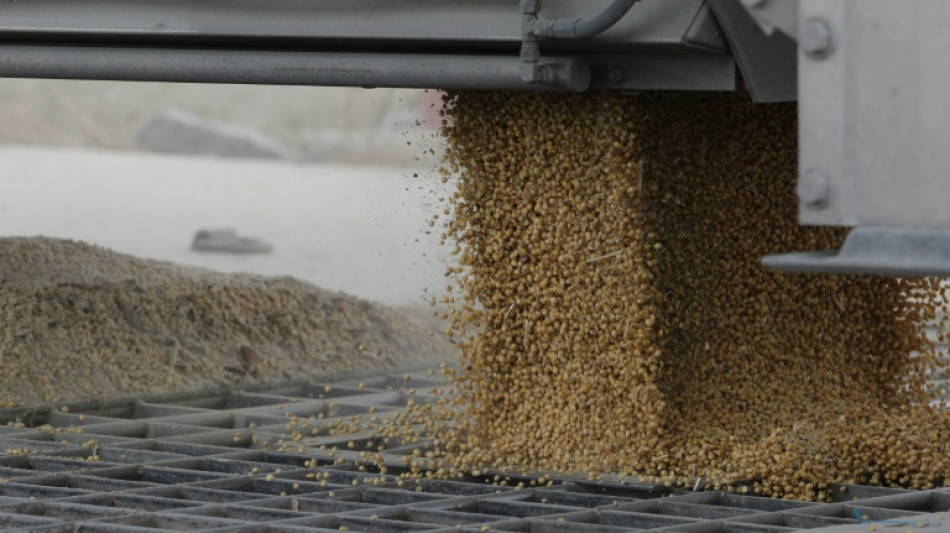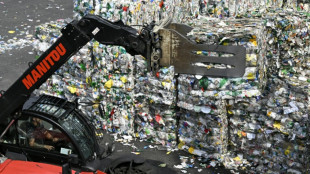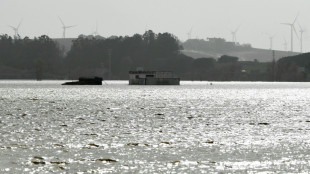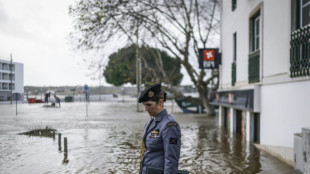
-
 France detects Russia-linked Epstein smear attempt against Macron
France detects Russia-linked Epstein smear attempt against Macron
-
Winter Olympics to open with star-studded ceremony

-
 Trump posts, then deletes, racist clip of Obamas as monkeys
Trump posts, then deletes, racist clip of Obamas as monkeys
-
Danone expands recall of infant formula batches in Europe

-
 Trump deletes racist video post of Obamas as monkeys
Trump deletes racist video post of Obamas as monkeys
-
Colombia's Rodriguez signs with MLS side Minnesota United

-
 UK police probing Mandelson after Epstein revelations search properties
UK police probing Mandelson after Epstein revelations search properties
-
Russian drone hits Ukrainian animal shelter

-
 US says new nuclear deal should include China, accuses Beijing of secret tests
US says new nuclear deal should include China, accuses Beijing of secret tests
-
French cycling hope Seixas dreaming of Tour de France debut

-
 France detects Russia-linked Epstein smear attempt against Macron: govt source
France detects Russia-linked Epstein smear attempt against Macron: govt source
-
EU nations back chemical recycling for plastic bottles

-
 Terror at Friday prayers: witnesses describe blast rocking Islamabad mosque
Terror at Friday prayers: witnesses describe blast rocking Islamabad mosque
-
Iran expects more US talks after 'positive atmosphere' in Oman

-
 US says 'key participant' in 2012 attack on Benghazi mission arrested
US says 'key participant' in 2012 attack on Benghazi mission arrested
-
Why bitcoin is losing its luster after stratospheric rise

-
 Arteta apologises to Rosenior after disrespect row
Arteta apologises to Rosenior after disrespect row
-
Terror at Friday prayers: witness describes 'extremely powerful' blast in Islamabad

-
 Winter Olympics men's downhill: Three things to watch
Winter Olympics men's downhill: Three things to watch
-
Ice dancers Chock and Bates shine as US lead Japan in team event

-
 Stellantis takes massive hit on 'overestimation' of EV demand
Stellantis takes massive hit on 'overestimation' of EV demand
-
Stocks rebound though tech stocks still suffer

-
 Spanish PM urges caution as fresh rain heads for flood zone
Spanish PM urges caution as fresh rain heads for flood zone
-
Iran says to hold more talks with US despite Trump military threats

-
 Russia accuses Kyiv of gun attack on army general in Moscow
Russia accuses Kyiv of gun attack on army general in Moscow
-
Cambodia reveals damage to UNESCO-listed temple after Thailand clashes

-
 Norway crown princess 'deeply regrets' Epstein friendship
Norway crown princess 'deeply regrets' Epstein friendship
-
Italy set for Winter Olympics opening ceremony as Vonn passes test

-
 England's Jacks says players back under-fire skipper Brook '100 percent'
England's Jacks says players back under-fire skipper Brook '100 percent'
-
Carrick relishing Frank reunion as Man Utd host Spurs

-
 Farrell keeps the faith in Irish still being at rugby's top table
Farrell keeps the faith in Irish still being at rugby's top table
-
Meloni, Vance hail 'shared values' amid pre-Olympic protests

-
 Olympic freestyle champion Gremaud says passion for skiing carried her through dark times
Olympic freestyle champion Gremaud says passion for skiing carried her through dark times
-
US urges new three-way nuclear deal with Russia and China

-
 Indonesia landslide death toll rises to 74
Indonesia landslide death toll rises to 74
-
Hemetsberger a 'happy psychopath' after final downhill training

-
 Suicide blast at Islamabad mosque kills at least 31, wounds over 130
Suicide blast at Islamabad mosque kills at least 31, wounds over 130
-
Elton John accuses UK tabloids publisher of 'abhorrent' privacy breaches

-
 Lindsey Vonn completes first downhill training run at Winter Olympics
Lindsey Vonn completes first downhill training run at Winter Olympics
-
Digital euro delay could leave Europe vulnerable, ECB warns

-
 Feyi-Waboso out of England's Six Nations opener against Wales
Feyi-Waboso out of England's Six Nations opener against Wales
-
Newcastle manager Howe pleads for Woltemade patience

-
 German exports to US plunge as tariffs exact heavy cost
German exports to US plunge as tariffs exact heavy cost
-
Portugal heads for presidential vote, fretting over storms and far-right

-
 Suicide blast at Islamabad mosque kills at least 30, wounds over 130: police
Suicide blast at Islamabad mosque kills at least 30, wounds over 130: police
-
Russia says Kyiv behind Moscow shooting of army general

-
 Greenland villagers focus on 'normal life' amid stress of US threat
Greenland villagers focus on 'normal life' amid stress of US threat
-
Iran, US hold talks in Oman after Trump military threats

-
 Stocks waver as tech worries build
Stocks waver as tech worries build
-
Dupont, Jalibert click to give France extra spark in Six Nations bid


Drought-hit farmers in US heartland hope Mississippi 'comes back'
Jonathan Driver, an Arkansas farmer with blackened hands and a thick southern drawl, doesn't have a minute to spare.
He's been working 16 or 17 hours a day to finish harvesting his crops and -- an added stress this year -- to find someplace to store tons of excess soybeans.
"Getting it out of that field is very crucial," Driver said as he stepped out of his white pick-up truck.
But for a second straight year, dangerously low water levels in the Mississippi River have drastically curtailed river transport, and that means added costs and complications for the farmers of the American heartland.
Driver, who sports a light beard and a gray baseball cap, also grows rice, which he stores in three squat corrugated-steel silos.
But the soybean harvest isn't done, and the barges that in normal years would take his product downriver are in terribly short supply, slowing grain shipments to the Gulf of Mexico and points beyond, eventually to feed livestock around the world.
So Driver plans to sell his rice as quickly as possible -- even if it's not for "the price I want" -- to make room for soybeans.
The need is pressing. For in his soybean fields, little yellow pods are already popping open and hitting the ground -- crops that will be lost.
It's a race against the clock.
- Low world prices -
"Every day you see pods popping, you're losing $3,000 a day," Driver said, before glumly adding, "I don't have $3,000 left to lose."
In the barn behind him, two men are busy repairing a massive combine harvester.
Driver's father was in the fields operating another harvester, and his wife was out working as well.
With storage in desperately short supply, the Drivers are employing grain bags -- enormous, long, tube-shaped plastic bags that, in proper conditions, can keep cereals good for some time, hopefully until traffic picks up again on the Mississippi.
"There is a possible scenario that you got to go into long-term storage" using the bags, Driver said, even "into sometime next year."
But this alternative storage method is a risky one, and not just because of possible bad weather.
After record global harvests this year, soybean and corn prices are depressed, and the buildup of grain reserves on US farms due to the problems on the Mississippi could keep prices low for some time.
- 'Going to come back up' -
There are alternatives to river transport -- mainly rail and truck -- but they cost more and emit more carbon dioxide.
Plus, local farmers feel a real attachment to the Mississippi.
Jimmy Moody works on riverfront land inherited from his grandfather in Tennessee, across the river from Driver's land in northern Arkansas.
For as long as he remembers, he said, grain "all gets shipped on a river to the Gulf. You know, if we can't unload on the river, then we've got to go east."
"So we're very dependent on the river," he adds.
The volume of grain shipped on the Mississippi has dropped by half from the average of the past three years, according to the US Department of Agriculture.
Like Driver, Moody is storing excess soybeans in the huge sausage-shaped bags, despite the inherent risks. He is hoping to get better prices for his crops once the Mississippi is again easily navigable.
"I don't have any worry about it," he said. "You know, the river's going to come back up."
At 71, Moody has seen hard times come and go.
"We'll still be shipping grain to the Gulf long after I'm gone," he said.
P.Tamimi--SF-PST



